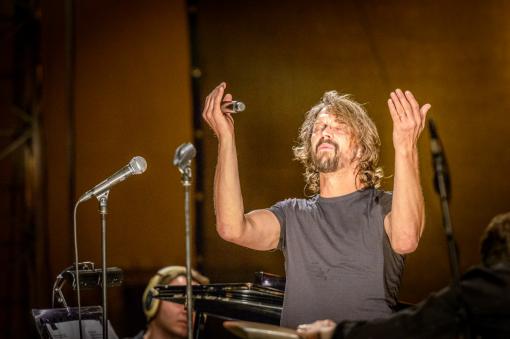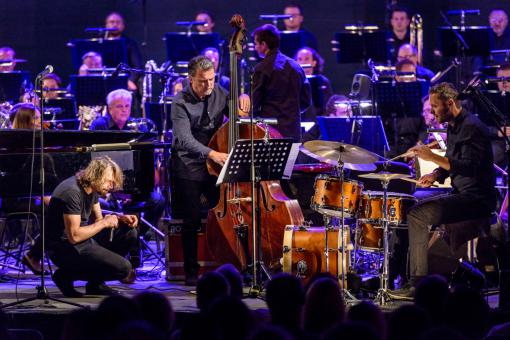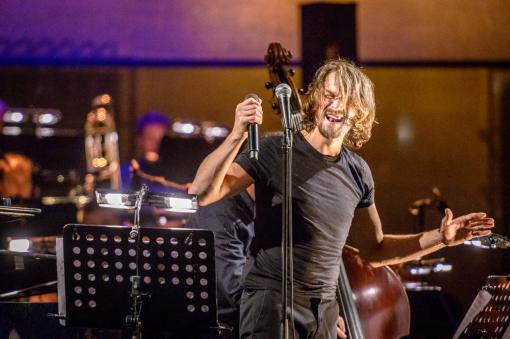Saturday night completed the 17th Špilberk International Music Festival with an original attempt at a dialogue between the jazz band Robert Balzar Trio with the exceptionally talented singer Dan Bárta and symphonists of the Brno Philharmonic Orchestra. The final, fifth concert of the festival in the crowded courtyard of the Brno castle provided a dignified end to the August series of musical evenings with live and recorded music, offering a varied mix of different musical genres.
For the Brno Philharmonic Orchestra, the farewell to the festival was also the first post-summer meeting on the threshold of the 61st concert season and an invitation to visit graduation concerts of the Jazz et World Music series, the dramaturgy of which is prepared by Vilém Spilka. This year, some of the performers, who the audience can look forward to, include the jazz pianist Justin Kauflin, Flamenco Experience Sextet, African multi-genre balafonist Aly Keita and joint performances of the trio of Martin Brunner with the Epoque Quartet.
Saturday's dialogue of the massive classical concert ensemble with the subtle jazz trio supported by the distinctive singer promised a trip through uncharted terrain of a genre-vague merger; the result was mainly anchored in the conceptually challenging pop and the offered layering of the follow-up monologues of both ensembles and more or less sophisticated attempts at a more difficult dialogue. Fans of the jazzrock ensemble of the RB Trio and Dan Bárta left more satisfied, as the ensemble dominated the first half of the concert – the many-headed musical ensemble of the Philharmonic Orchestra mostly turned into an extra one hundred members of the audience.
 In addition to his own project entitled Illustratosphere and concerts during the JazzFest Brno, mainly with the Robert Balzar Trio, the charismatic Dan Bárta, a performer well known for the Brno audience, does not avoid challenging experiments. For Saturday's concert in Brno, he chose material from the six-year-old joint project They-or-Ies with original adaptations of world pop music hits that pianist Jiří Levíček and double bass player Robert Balzar also arranged for a symphony orchestra of the size of the Brno Philharmonic Orchestra. The deep interdependence of this three-member jazz group with the Brno musical environment is interesting for the Brno audience: pianist and composer Jiří Levíček was born in Brno and studied piano at JAMU (where he also teaches today at the Department of Jazz Interpretation) and has long been cooperating with a number of Brno jazz musicians; the connection of drummer Kamil Slezák with Brno dates back to 2001, when he became a member of the Gustav Brom Orchestra, and he was working at JAMU as a teacher for ten years, simultaneously at the Department of Percussion Instruments and at the Department of Jazz Interpretation, and is a member of the folk-rock band Druhá tráva. Robert Balzar, the leader of the ensemble and the fateful companion of Dan Bárta, is a worthy successor to the Brno double bass school: he graduated from the Brno Conservatory with the class of Alois Kříž and Karel Kopřiva. He founded the jazz trio under his own name in 1996 and his multilateral cooperation with Dan Bárta began two years later: first in the respected funk band J.A.R., then in its dance counterpart called Sexy Dancers. In 2000, he founded the Illustratosphere project on the border between jazz and cultivated pop together with Bárta (Bárta dominating as the author); a year earlier, Bárta worked with the RB Trio (which remains the authorship mirror of Robert Balzar).
In addition to his own project entitled Illustratosphere and concerts during the JazzFest Brno, mainly with the Robert Balzar Trio, the charismatic Dan Bárta, a performer well known for the Brno audience, does not avoid challenging experiments. For Saturday's concert in Brno, he chose material from the six-year-old joint project They-or-Ies with original adaptations of world pop music hits that pianist Jiří Levíček and double bass player Robert Balzar also arranged for a symphony orchestra of the size of the Brno Philharmonic Orchestra. The deep interdependence of this three-member jazz group with the Brno musical environment is interesting for the Brno audience: pianist and composer Jiří Levíček was born in Brno and studied piano at JAMU (where he also teaches today at the Department of Jazz Interpretation) and has long been cooperating with a number of Brno jazz musicians; the connection of drummer Kamil Slezák with Brno dates back to 2001, when he became a member of the Gustav Brom Orchestra, and he was working at JAMU as a teacher for ten years, simultaneously at the Department of Percussion Instruments and at the Department of Jazz Interpretation, and is a member of the folk-rock band Druhá tráva. Robert Balzar, the leader of the ensemble and the fateful companion of Dan Bárta, is a worthy successor to the Brno double bass school: he graduated from the Brno Conservatory with the class of Alois Kříž and Karel Kopřiva. He founded the jazz trio under his own name in 1996 and his multilateral cooperation with Dan Bárta began two years later: first in the respected funk band J.A.R., then in its dance counterpart called Sexy Dancers. In 2000, he founded the Illustratosphere project on the border between jazz and cultivated pop together with Bárta (Bárta dominating as the author); a year earlier, Bárta worked with the RB Trio (which remains the authorship mirror of Robert Balzar).
 Saturday's concert in the courtyard of Špilberk Castle was the premiere of a series planned directly to the order of the Brno Philharmonic Orchestra and also the first step towards cooperation that had been under consideration for a long time. The time for rehearsal (especially in the coordination of both ensembles under the baton of another JAMU graduate Ondrej Olos) was relatively short which was evident in several cases; however, the potential of the joint performance is undeniable. Despite the initial rhythmic uncertainty in the first half of the concert, this was demonstrated by the "iconic" Brother Wolf, Sister Moon, the revived Mayday from Bárta’s ancient times and a memory of the Weather Report and Joe Zawinul at the beginning of the second part of the concert. The second half indeed brought satisfaction to the pronounced supporters of the Brno Philharmonic Orchestra, for whom the independent trips to the world of pop through the slightly jazzed Levíček's and Balzar's arrangements with rather loose solo piano and double bass passages were harder to digest (Too Young to Die by Jamiroquai, No Quarter by the iconic Led Zeppelin). Even the excellent sound, which allowed for the resulting "equalisation" of the sound of the three-member chamber band with the multi-member Philharmonic Orchestra so that none of the momentary soloists, detailed ostinato sections in orchestral sequences or the singer's voice fade, contributed to the great readability of the musical arrangements (and in some areas, of course, to revealing the not yet quite perfect harmony).
Saturday's concert in the courtyard of Špilberk Castle was the premiere of a series planned directly to the order of the Brno Philharmonic Orchestra and also the first step towards cooperation that had been under consideration for a long time. The time for rehearsal (especially in the coordination of both ensembles under the baton of another JAMU graduate Ondrej Olos) was relatively short which was evident in several cases; however, the potential of the joint performance is undeniable. Despite the initial rhythmic uncertainty in the first half of the concert, this was demonstrated by the "iconic" Brother Wolf, Sister Moon, the revived Mayday from Bárta’s ancient times and a memory of the Weather Report and Joe Zawinul at the beginning of the second part of the concert. The second half indeed brought satisfaction to the pronounced supporters of the Brno Philharmonic Orchestra, for whom the independent trips to the world of pop through the slightly jazzed Levíček's and Balzar's arrangements with rather loose solo piano and double bass passages were harder to digest (Too Young to Die by Jamiroquai, No Quarter by the iconic Led Zeppelin). Even the excellent sound, which allowed for the resulting "equalisation" of the sound of the three-member chamber band with the multi-member Philharmonic Orchestra so that none of the momentary soloists, detailed ostinato sections in orchestral sequences or the singer's voice fade, contributed to the great readability of the musical arrangements (and in some areas, of course, to revealing the not yet quite perfect harmony).
 The advantages of the artistic project of a joint concert excelled mainly after the break, when two musical peaks came: the song Isobel made famous in the interpretation of Icelandic singer Björk Guðmundsdóttir and the eighty-year-old film soundtrack Smile composed by Charlie Chaplin for the film Modern Times (Dan Bárta signs the lyrics of Turner and Parsons additionally written for Nat King Cole). Both musical numbers outlined a possible path of joint concerts of the RB Trio with the Philharmonic Orchestra with the equal use of both components, accompanied by an excellent singer and a harmonic arrangement for both ensembles. Stmívání with the well-chosen dominant ostinato of the Philharmonic brass section was also interesting. Conversely, the problematic nature of the jazz syncopation for the musical feeling of symphony musicians is traditional and requires targeted training and long-term rehearsals, otherwise the result is unorganised and spilled (Duha). The degree of the signer's empathy was most apparent in songs of female authors-performers Björk and Joni Mitchell where he richly utilised his vocal and expressive potential.
The advantages of the artistic project of a joint concert excelled mainly after the break, when two musical peaks came: the song Isobel made famous in the interpretation of Icelandic singer Björk Guðmundsdóttir and the eighty-year-old film soundtrack Smile composed by Charlie Chaplin for the film Modern Times (Dan Bárta signs the lyrics of Turner and Parsons additionally written for Nat King Cole). Both musical numbers outlined a possible path of joint concerts of the RB Trio with the Philharmonic Orchestra with the equal use of both components, accompanied by an excellent singer and a harmonic arrangement for both ensembles. Stmívání with the well-chosen dominant ostinato of the Philharmonic brass section was also interesting. Conversely, the problematic nature of the jazz syncopation for the musical feeling of symphony musicians is traditional and requires targeted training and long-term rehearsals, otherwise the result is unorganised and spilled (Duha). The degree of the signer's empathy was most apparent in songs of female authors-performers Björk and Joni Mitchell where he richly utilised his vocal and expressive potential.
The final song Last Chance Lost with a jazz feeling from the album Turbulent Indigo by the Canadian songwriter Joni Mitchell gave the audience the opportunity to enjoy the quality of both ensembles and a pleasant climax of the concert without having fulfilled its sceptical name (Last Chance Lost) - on the contrary: the outlined potential of the cooperation of the Brno Philharmonic Orchestra with the top level jazz Robert Balzar Trio and the high-quality creative signer Dan Bárta is apparent, it only needs to be polished.
































No comment added yet..